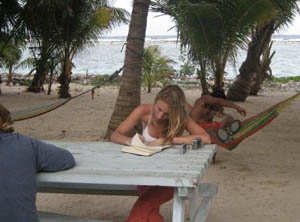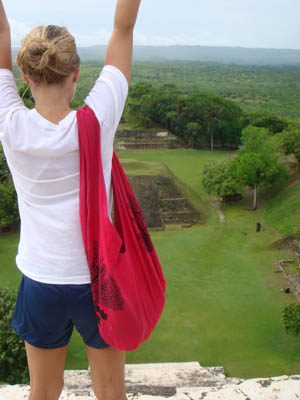

Venture Boldly

 Nora Nelson ’09 and Clint Moore ’09 spent the summer studying, attending class and conducting research. But their summer was not all washed up. Their class involved underwater research with Knox's W. Bartlett Professor of Biology Linda Dybas off the coast of Belize.
Nora Nelson ’09 and Clint Moore ’09 spent the summer studying, attending class and conducting research. But their summer was not all washed up. Their class involved underwater research with Knox's W. Bartlett Professor of Biology Linda Dybas off the coast of Belize.
These Knox students, along with approximately 10 others, spent two weeks examining the coral reef. Their classroom was the island of Tobacco Caye. They often went to class barefoot, toting sand everywhere and usually only opened a notebook in the lab or study hall - the picnic table.
The island’s Caribbean coast is lined with a coral reef and some 450 islets and islands known as the cayes (pronounced “keyes”) which form approximately 200 miles of the Belize Barrier Reef. It is the longest in the Western Hemisphere and the second longest in the world after the Great Barrier Reef.
“The class focused a lot on the coral reef itself. Beach line erosion is being combated with garbage on the reef/key,” Nelson, who is double majoring in biology and environmental studies, says.
“The lab was a kitchen in the house of the resort manager. So, it was a kitchen lab basically. The lab bench was the kitchen table,” she adds.
Holding tanks, microscopes, numerous books, instruments for dissection and anything needed for field work were among the supplies that the students brought from Knox College.
While the rest of the class spent the morning researching, Moore, who received funding from an HHMI grant, spent much of his class time scuba diving. “Diving was a big part of my project, so I was pretty much in the water when conditions would allow. But most of the people could do their projects with just snorkeling,” the biology and environmental studies major says.
The group would meet for meals, and incorporate ‘down time’ between lab and research time. After the sun went down, and the locals turned off the only generator, Moore and Nelson both said that the group “hung out with the locals.”
 “We definitely did our work but there was definitely down time to explore” Nelson says.
“We definitely did our work but there was definitely down time to explore” Nelson says.
“It was a time for learning about you/about them,” Moore adds. “We learned to appreciate how these people lived and how simple you can live and be happy.”
Nelson conducted a microderm survey for sea grass beds off the shore of the keys, while Moore examined the population dynamics, diversity and richness of the organisms living on the reef.
This was the second time that Professor Linda Dybas took a class to Belize for the up-close and personal experience. But, this is not a restorative vacation. The students conducted research rather than lazing at the beach while the keel billed toucan sat perched in a mahogany tree. - Well, they do that, too.
Students stayed in privately owned beach hut resort-type places. “Definitely not your average resort,” Nelson says. “It is more for your eco tourist/student travelers who don’t need all the amenities.”
Whether examining the fate of the fire coral, the pattern of the fire sponge or the feeding habits of turtles, Moore and Nelson say there were other lessons and opportunities. “We studied the history and ecology of Belize, and if you had any outside interests, there was time to get that in on top of your research,” Nelson says.
On their return to the Knox campus, Nelson and Moore agree that it was challenging to pick up the books and highlighters. But, they each are looking forward to what life after Knox brings to each.
“I want to explore international environmental policy,” Nelson says. “I knew it before I came here. It is one of the reasons I picked Knox. I thought it was a great find to have a program with that sort of longstanding at the undergraduate level. I look forward to what it is going to do for me after Knox.”
“My decision to come to Knox weighed on the biology department,” Moore says. “I visited Knox and loved it. Between that and the school’s credibility, it was pretty much a done deal.”
They both feel prepared for their next step after Knox.
“If I am lucky enough to get into one of the grad schools that I really want, I will probably take that plunge right away then a PhD in marine biology,” Moore speculates.
Nelson is weighing her options, but says she wants to work in a developing country. “There are a lot of options on the table and I feel well prepared through my education here.”
Nora Nelson '09 hits the books one afternoon during her research trip to Belize. Nelson was one of a dozen students that traveled with Professor Linda Dybas to Belize. It is the second trip the Knox professor has made to the Island.
Published on October 06, 2008